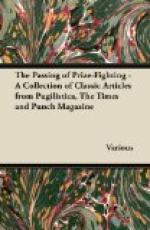Cabinet pudding, if a “left-over,” should perhaps be called “reconstruction pudding.” Here again the amount of egg and sugar used must vary in a direct ratio with the size of the family appetite. Prepared to suit that of the family of the late Dr. TANNER, such a dinner as the above is not merely inexpensive, it costs nothing at all.
* * * * *
“All mules attached to the American Army in France have little khaki bags containing gas masks fastened to the collars of their harness. In the event of a gas attack these are slipped over their pleading noses.”—Daily Paper.
This, we understand, is not what the drivers call them.
* * * * *
LESE-MAJESTE.
Our triumphal march into Germany having been arrested just west of the Meuse, Sir DOUGLAS HAIG (through the usual channels) gave me ten days’ leave to visit the historic town of St. Omer. As I only asked for seven-days and he gave me ten I knew there was a catch somewhere. It appeared that the ten days was worked out on the idea that it would take me five days to get there and five to get back. Needless to say I ignored trains, which are a snare and delusion in these days. I lorry-hopped. Most people would think many times before lorry-hopping from Charleroi to Lille via Brussels and Tournai, but there is nothing that a man with a leave warrant in his pocket will not do—except perhaps save money.
It was during this leave that I barged right into GEORGE, “George” being our very own King, besides being Emperor of India.
To bridge the apparent gap between my arrival and the perturbing catastrophe referred to, it is only necessary to add that if you enter from the main route from Hazebrouck you will find just off the road a convoy of some sixty dear things seeing as much life as can be beheld while groping into the insides of the Red Cross motor ambulance which it is their job to feed, wash, coax and drive.
I have the entree here (except when the relentless Miss Commanding Officer chases me out for breaking the two-and-a-half rules which govern the place), and when I admitted incautiously that the only place on the Front that I had not seen or been frightened at was Passchendaele, they smiled pityingly and promised to take me there on Sunday for a joy ride. Shades of 1917! What whirligigs of circumstance time and the armistice have brought us! It was in the joy ride we nearly upset a dynasty.




